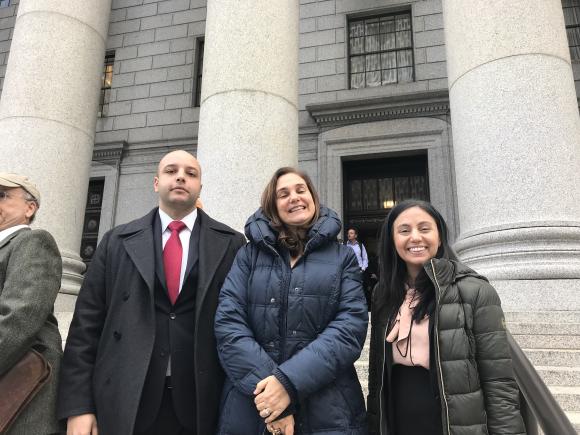
The Rutgers International Human Rights Clinic pursues cases and projects in U.S. domestic courts and international tribunals to address human rights violations occurring within and beyond U.S. borders.
True to form, the first assignment of the school year had my fellow law students and me in the International Human Rights Clinic hitting the ground running. A looming deadline for filing an amicus brief on behalf of award-winning Mexican journalist Emilio Guttieréz Soto, who is seeking political asylum and who was jailed after protesting this administration's inhumane immigration policies, had us engaged even before the semester formally began.
More recently, the clinic drafted and filed an amicus brief supporting Ravi Ragbir’s claims against Immigration and Customs Enforcement that he was unconstitutionally detained and targeted for deportation simply for exercising his free speech rights. The Rutgers International Human Rights Clinic argued that ICE violated international law by targeting Ragbir, a well-known political activist who heads the NYC-based New Sanctuary Coalition, for engaging in protected political speech.
All my classmates in the clinic played a role in drafting and revising the amicus brief. Many were not only learning how to craft nuanced arguments supported by international law but also how to work collaboratively on a legal brief.
Each student dedicated a lot of time to the brief in order to ensure that it could be filed in time. My classmate, Maria Nieto, told me, “Writing this brief provided us with real-world experience in teamwork and in dealing with tight deadlines." Under the supervision of Clinic Director Professor Penny Venetis, my classmates: Elise Zarelli-Dorsey, Nieto, Morgan McGoughran, Vivian Isaboke, Humza Qureshi and I, saw their our hard work pay off when the U.S. Court of Appeals for the Second Circuit permitted Ragbir to say in the U.S.
On Monday, October 29, we attended the oral argument in Ragbir’s case at the Second Circuit Court of Appeals in Manhattan. So many of his supporters attended, that they occupied multiple spillover rooms outside the courtroom. In court, the panel of Judges Walker, Leval, and Droney and counsel highlighted the unique importance of the First Amendment and how the essence of Ragbir’s claim was the exercise of his right to free speech.
At oral argument, the government unsuccessfully argued that the court would not even be able to hear the case. Clearly, organized government retaliation that violates the First Amendment is so outrageous that the court not only heard the case but also permitted Ragbir to stay in the United States. Ravi Ragbir’s victory demonstrates that Rutgers clinical students continue to make a difference in high-stakes cases. Our clinical work benefits real people—and highlights the importance of collaborating with the local community in the fight for justice.
